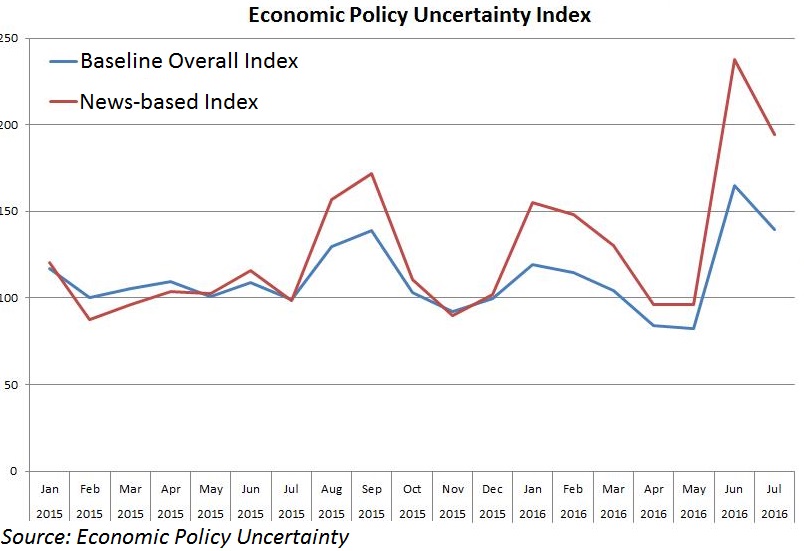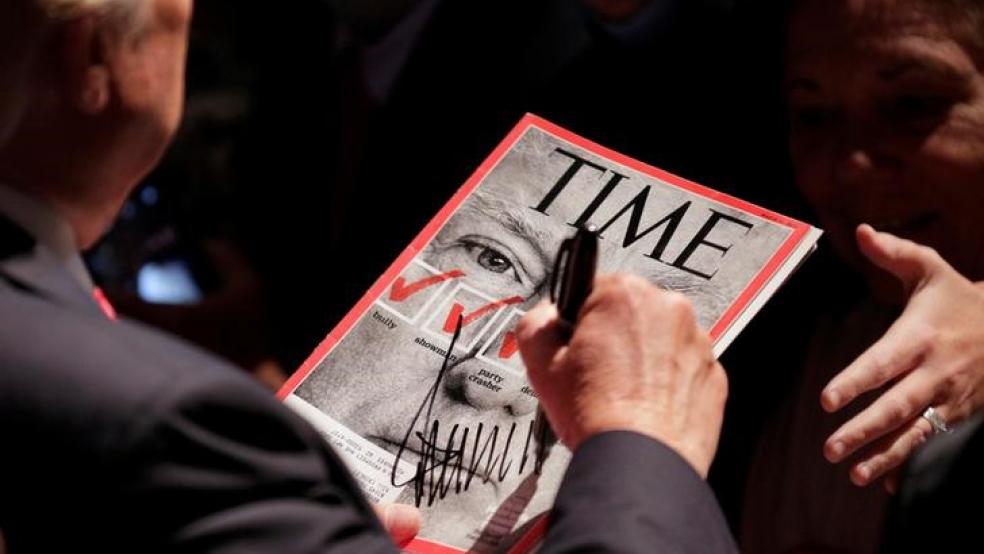It's the election, stupid.
The sparring between Hillary Clinton and Donald Trump can only heat up, and some economists fear the election will worsen an already-high level of uncertainty that has caused damage to the economy and could rattle markets.
Related: Is Trump Trying to Game the Presidential Debates?
"I think more people are getting more worried about what the presidential election will do," said Chris Rupkey, chief financial economist at MUFG. "I don't count that out as a major risk factor. It could make Brexit look like peanuts in terms of the financial market effect."
Economists are forecasting U.S. growth of more than 2 percent in the second half, after the first half grew at a sluggish 1 percent pace.
But those forecasts could be at risk if uncertainty around the U.S. election increases. Sixty percent of the participants in the recent CNBC Fed survey said the presidential election is a negative for the economic outlook.
Citigroup's William Lee, head of North American economic research, believes GDP has already been impacted by uncertainty around the foreign issues like Brexit but even more so by the U.S. election, and it will continue to do so.
Related: Here’s How Trump Would Deal With Losing the Election
"I think we're experiencing the drag right now, and it could get bigger," said Lee. He expects the political uncertainty to be hitting business investment and consumption, knocking an average of about a half percentage point off growth in each of the second, third and fourth quarters.
Lee calculates the damage by hits to investment in software and intellectual property and investment in structures, as well as consumption. For instance, uncertainty may have carved nearly 0.4 percentage points off second-quarter GDP, and according to his calculation, half was from lower investment and half from consumption.
Lee said he looks at the Economic Policy Uncertainty Index, created by three academicians. The index showed a spike around the Brexit vote, and the monthly data show it is elevated to a level close to where it was at when China devalued its currency last summer. The monthly version of the index is based on the top 10 U.S. newspapers' frequency of use of certain words, including economic and uncertainty and a number of words around policy, such as Federal Reserve.
Nicholas Bloom, the Stanford University professor who helped create the index, said Trump is clearly the candidate who generates the most uncertainty.
Bloom explained that elections usually begin to create spikes in uncertainty in September, but that could be different this year and his uncertainty index could begin rising this month. If Trump appears to lead in the polls, the index could spike and stay elevated, he said.
"If you look historically, investment expenditures respond very much to uncertainty. That's the thing that gets throttled back when uncertainty rises. Consumers don't seem to pay much attention to it, but business does," said Bloom.

Related: GOP Convention Made History (and Not in A Good Way)
Bloom said Trump is completely different than other candidates in that he has no political experience or policy team, and he breaks from the standard GOP party line. That makes uncertainty around his presidency "massive" and he expects the uncertainty index to be much higher than it is for most first time elections.
"He makes statements. He changes his mind. He has no track record. He has no advisers. He's a blank state right now," said Bloom. That means it could take months to understand his positions should Trump win, and uncertainty could be elevated through next summer as he sorts out positions and works out his relationship with Congress and foreign governments, Bloom said.
"It will probably lead to a drop in investment by large firms and the sector that will be most impacted will be manufacturing because the president has the most influence on trade," Bloom said. He said military, health care and construction sectors could also be impacted.
In the second quarter, GDP grew at 1.2 percent, on the back of consumer spending, which grew by 4.2 percent. Business spending was weak, and there was a 1.2 percent drag from inventories.
Deutsche Bank chief economist Joseph LaVorgna agrees part of the weakness in business spending could already be due to apprehension about the election.
Related: Why Clinton’s Plan to Boost Worker Pay Is Doomed to Fail
"Nobody's going to invest ahead of the election. Who is going to invest? They're going to wait to see what happens. It's not like the candidates are saying the same thing with the same tax policy. Certainly both parties have totally different ideas of how they're going to approach tax reform," said LaVorgna.
LaVorgna said the hit to the economy could be a couple of tenths of a percent of growth, significant when considering how low the growth rate has been. Instead of investing, he said companies are doing other things with their cash.
"Companies are doing what they've been doing much of the cycle — buying back stock and doing M&A [mergers]. They've been doing it in the equity market but it's really unproductive. It creates a more volatile environment because they're replacing equity with debt," he said.
Lee also said Trump's policies are harder to determine and he therefore creates the conditions for an increase in uncertainty. "If it's a Clinton scenario, it's very close to the current baseline. I would say the uncertainty would be much lower," he said.
Bloom said there is much less uncertainty around Clinton because she's already been in office, and her choice of running mate, Sen. Tim Kaine, is also known.
"Trump is a greater wild card," Lee said.
Related: Trump Is Wrong About Russia, but He Does Get One Thing Right
"One caveat is we don't know what Trump is. … He seems to be someone who places policies out as trial balloons and then renegs on them, and you can't get a fix on where he is. The best spin his people put on it is that everything is a negotiating position. The actual outcome would be much more muted than those kind of outrageous comments would imply," Lee said.
Trump's campaign did not immediately respond to a CNBC request for comment.
Trump has proposed a revamping of the tax structure, in a revenue- neutral plan that would cut taxes for corporations to 15 percent. He would declare a one-time tax rate of 10 percent to encourage companies to bring home cash they are currently holding abroad.
He also proposes a more simplified tax plan for individuals that would have a top tax rate to 25 percent.
Trump also blames U.S. trade policies for a wave of globalization that has ruined U.S. manufacturing, and he says he would bring an economic revival.
Related: What Happens If Neither Clinton Nor Trump Get Enough Electoral Votes?
Rupkey said he doesn't believe the slow economy and low spending by companies is from the election, just yet. "I don't know if companies are really postponing projects. I think they've already undertaken projects. July starts the eighth year of the expansion," he said. "I think we've already seen the biggest move the companies are going to take. Look at car sales — they already maxed out there. Washington uncertainty doesn't have to be at the root of this. It's the passage of time and companies have already made a lot of expenditures."
Rupkey said uncertainty over the election could come later. "I still think it's true that the most leading of leading economic indicators for the future is stock prices," he said. Stocks are trading close to all-time highs.
Diane Swonk, CEO of DS Economics, said a breakdown in spending relative to profits began even before the financial crisis. "There's a lot of cross currents. We've got consumer strength, business weakness," she said. Business investment is soft but some is beneficial longer term, like cloud spending, and some is out of necessity, like cybersecurity.
She said she believes CEOs are still thinking globally. "They're still thinking multinational strategies. They seem to be unfazed by the talk of rising protectionism or a backlash to free trade," she said.
Swonk also said the economic reaction to the election may be difficult to measure and some things could be too subtle. For instance, the impact of Trump's comments on building a wall along the Mexican border and toughening immigration could be discouraging immigrants from entering or staying in the U.S. That could have a longer term impact on the workforce, she said.
"Over time, it would have a detrimental impact on the economy. It's hard to measure it. It's one of the places that is least understood and the most at risk with the self-fulfilling prophecy, which could be to the negative," she said. Swonk added that the trend of more Mexicans leaving the U.S. than entering has already been seen since the financial crisis.
"We know the economic impact that would have in terms of our skilled workers," Lee said. "I think he eventually will temper himself."
Lee said Trump's positions have international repercussions on uncertainty. "The NATO issue is something he threw out there, and it's something I'm guessing is a negotiating ploy rather than something to be taken seriously," said Lee. "The view from abroad is one of much more uncertainty and more threatening to the current network of agreements." Trump said recently that he didn't expect the U.S. to automatically defend all NATO allies.
Trade is another touchy area, and both candidates oppose the Trans-Pacific Partnership trade deal. Trump has said he would get rid of NAFTA, the trade pact between the U.S., Mexico and Canada. Clinton also reportedly would renegotiate it.
"If he starts to go down the line of declaring China a currency manipulator, and trying to tear up treaties, that he cannot do," Lee said. "That talk could evoke some type of trade war if he could carry through with it. We know that would be harmful for the economy. He wouldn't go all the way."
Swonk said Brexit sets an example for the U.S. "Uncertainty is huge and we've proven it," she said. "The markets haven't reacted yet, and they have a hard time pricing this risk. It's somewhat unprecedented."
This article originally appeared on CNBC. Read more from CNBC:
Why Jamie Dimon is wrong about the US economy




